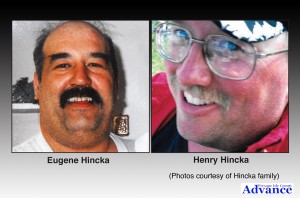Jurors given four options before finding Strzelecki ‘guilty, but mentally ill’

Jurors found Richard Strzelecki, 64, of Posen guilty but mentally ill on six counts Wednesday evening in 53rd Circuit Court in Presque Isle County. Through the course of the three-day trial defense attorney Dan Harris and co-counsel Travis Groat were arguing for legal insanity regarding the charges stemming from the Jan. 15 murder of brothers Henry and Eugene Hincka.
The Honorable Judge Scott L. Pavlich explained to the jury in final instructions before releasing them to deliberations what the charges were and the choices they had when coming up with a verdict.
“In this case since there is an insanity defense if you find that the prosecutor has proven every element of each charge beyond a reasonable doubt then the defense does have the burden to prove by a preponderance of the evidence the defense of insanity,” said Pavlich.
He then explained that if the jury felt that the prosecutor had not proven the elements of each charge beyond a reasonable doubt the jury must return a verdict of not guilty.
“One of the defenses raised in this case is that the defendant was legally insane at the time of the crime. Under the law mental illness and legal insanity are not the same. A person can be mentally ill and still not be legally insane, because of this and because the law treats people who commit crimes differently depending on their mental state at the time of the crime it is important for you to understand the legal meanings of mental illness and legal insanity,” said Pavlich.
The law defines mental illness as a “substantial disorder or thought or mood that significantly impairs judgment, behavior, capacity to recognize reality or the ability to cope with the ordinary demands of life.”
Pavlich then explained legal insanity. “To be legally insane a person must be mentally ill as I have defined that condition but that is not enough,” said Pavlich.
The legal definition for legal insanity is that “a person must because of mental illness lack substantial capacity either to appreciate the nature and quality or the wrongfulness of the conduct or to conform his conduct to the requirements of the law.”
“To decide whether the defendant was legally insane at the time of the crime you should go through the following two steps. Step one, are you satisfied that the defendant has established by evidence that outweighs the evidence against it that he was mentally ill at the time of the crime. Unless you are so satisfied he was not legally insane. On the other hand if the defendant has proved that he was mentally ill you must go on to the next step. Step two, are you satisfied that the defendant has established by evidence that outweighs the evidence against it that he lacked the substantial ability either to appreciate the nature and quality of the wrongfulness of his conduct or to conform his conduct to the requirements of the law he is charged with violating. If the defendant has proven both step one and step two you must find him not guilty by reason of insanity,” explained Pavlich.
FOR EACH of the six charges the jury was to find a verdict on, they were given the choices of not guilty, not guilty by reason of insanity, guilty but mentally ill and guilty.
“There is another verdict that is completely different from the verdict of not guilty because of insanity, this is called guilty but mentally ill. To find the defendant guilty but mentally ill you must find each of the following; first, the prosecutor has proved beyond a reasonable doubt that the defendant is guilty of a crime; second, that the defendant has proved by a preponderance of the evidence that he was mentally ill, as I have defined that term for you, at the time of the crime; third, that the defendant has not proved by a preponderance of the evidence that he lacked substantial capacity either to appreciate the nature and quality or the wrongfulness of his conduct or to conform his conduct to the requirements of the law,” said Pavlich.
DURING
Following more than four hours of deliberation, the jury found Strzelecki guilty but mentally ill on the following six counts; homicide first degree Eugene Hincka; homicide first degree Henry Hincka; felony murder Eugene Hincka; felony murder Henry Hincka; home invasion first degree and felony firearms.
(More on this story will be published in the Oct. 8, 2015 edition of the Presque Isle County Advance)

